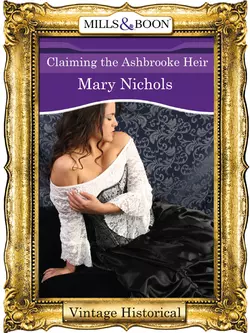Claiming the Ashbrooke Heir

Mary Nichols
Тип: электронная книга
Жанр: Современная зарубежная литература
Язык: на английском языке
Стоимость: 386.29 ₽
Статус: В продаже
Издательство: HarperCollins
Дата публикации: 16.04.2024
Отзывы: Пока нет Добавить отзыв
О книге: At a time when having a baby out of wedlock is a disgrace and means certain ruin, Annette Ryston is at her wits′ end.Rejected by the father of her child, turned away from her work and her home she is determined to bring her son up to the best of her ability by taking in sewing, unaware that there is someone looking for her.The encounter with Major Charles Ashbrooke, when it comes, makes her realise how fragile is the life she has built around herself and how easily it could fall around her ears. But Annette is not all she seems and Charles recognises there is a mystery to be solved and in solving it, finds himself revising his opinion of the lovely girl…